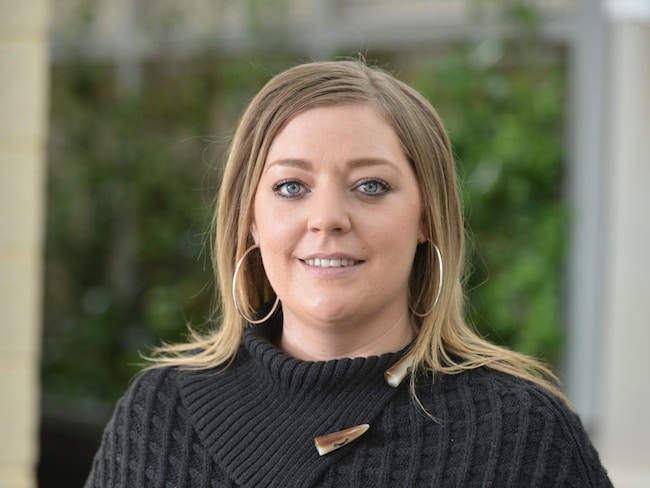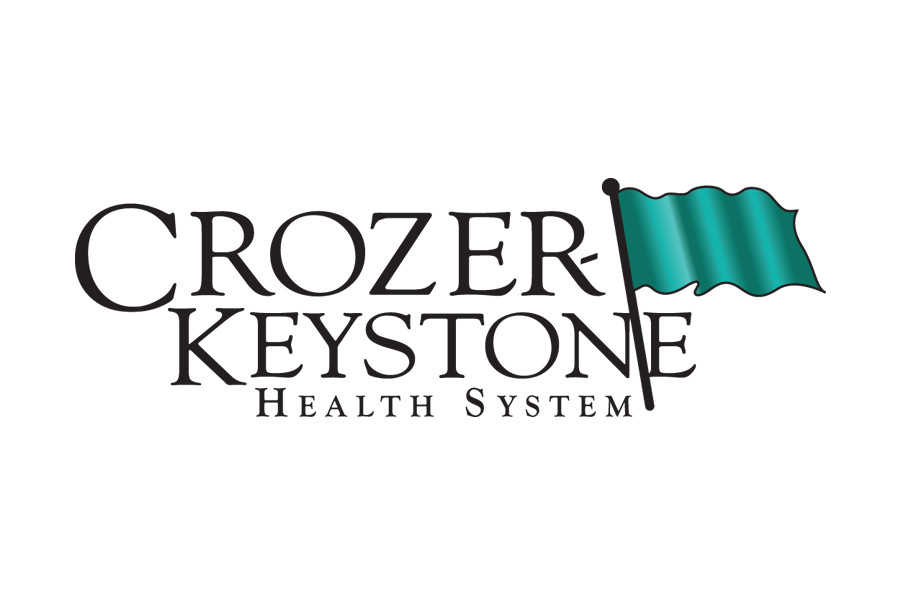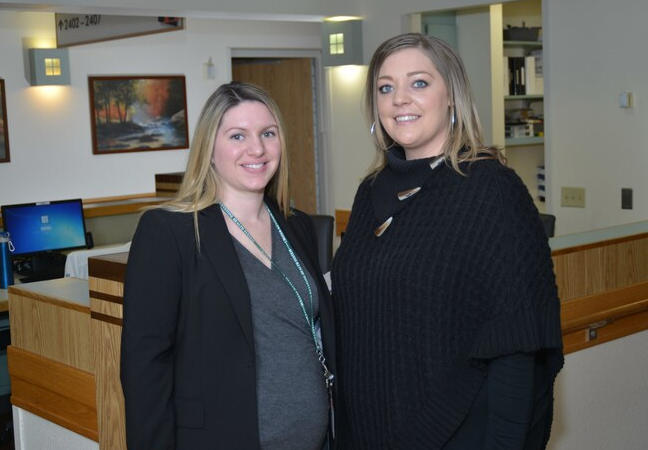On January 10, 2018, Pennsylvania Governor Tom Wolf declared a state emergency on the heroin and opioid epidemic that has swept the state (and nation). His declaration made Pennsylvania the eighth state to do so.
Former New Jersey Governor Chris Christie appeared in a TV campaign, titled Reach NJ, that featured former addicts who had overcome the disease and told their stories. One of the campaign goals was to “put a voice” to the epidemic that killed over 66,000 people in the United States in 2017 alone.
According to Dave Moran, director of the Crozer-Keystone Recovery Center, you don’t have to look any further than Ashley Zimmerman for that voice of addiction.

An early introduction
Zimmerman grew up in Delaware County and attended Ridley High School. For her, high school was a tough time. Her group of friends used drugs, and she always felt out of place and different from the social circle.
Until she was introduced to opioids.
“I suddenly became more social, more accepted,” Zimmerman said. “I just kept using from then on out.”
She said her start with opioids was gradual, but her addictive personality led her to take the drugs more and more. She said the drugs made her feel like the hole that was inside of her was filled, making it harder to stop.
Zimmerman’s friends were able to control their use of drugs to recreationally on the weekends, but she was the only one who “always had to do more.” She was using opioids before and during school, especially when she would get out at 11 a.m. for work-study.
“I was using every day by my junior year of high school,” Zimmerman recalled.
She thought she could control it, but as is for most addicts, her life started spiraling downward before her eyes. Her teachers started to notice a change in her behavior. She was lying and stealing from her parents. Everything came to a breaking point one night when she was 18 years old.
“I tried to drive intoxicated one night and my mom tried to stop me,” Zimmerman said. “But I got behind the wheel anyway and she called the cops. They gave me the option to either go to jail or get help.”
But taking advice or guidance as an 18-year-old is never an easy thing, whether dependent on opioids or not. It would be the start of a long road for Zimmerman.
Nowhere to go but up
Zimmerman told the police that she wanted to get help, which led her into a recovery program. Although at the time, she didn’t know if she really meant it or not. She received a sober support system and an introduction to the 12 Steps early on, which she kept with her on her recovery journey. But Zimmerman said she was so young that she was not fully committed to getting treatment.
“The thought of never drinking again or not drinking on the weekends scared me,” Zimmerman said. “I always wanted to be normal, and I don’t think I fully accepted that I had an issue.”
A few years later came a dead-set moment when Zimmerman realized that she did have a problem, and it needed to be addressed. She ended up being put in jail for drug use. She had always had support from her family no matter what, but she knew this was different from all the other times.
“My parents would always try and help me and this time they didn’t help at all,” Zimmerman said. “They took a step back. They weren’t calling their friends that were cops or judges. They made me face my consequences.”
This was the bottom for Zimmerman. She had nowhere else to turn. Her best friend had died of an overdose a year earlier, and she did not want to go down that road for both her and her family’s sake.
“I was sick and tired of being sick and tired, she said. “I was tired of hurting them and hurting myself.”
Zimmerman decided that she needed to make changes in her life and take recovery seriously. Her sister was pregnant at the time she went to jail, and Zimmerman realized that she needed to stay clean for her future niece and the rest of her family.

The necessary changes
Because Zimmerman had never really been in trouble before, her lawyer suggested that she enter into the drug court program. The program monitors recovering addicts to ensure they are making strides to recovery, which gets them out on the streets faster than just serving a jail sentence.
“People are saying not to go to drug court, to stay in jail,” Moran said. “Drug court gets you out in the community. You just have to answer to them and you can’t use. And people are saying don’t go to drug court?”
Zimmerman’s lawyer also said she was eligible to have her record expunged if she completed the program. That was the most attractive part of the program for her, because she wanted to go back to school at some point.
So Zimmerman started the program, which sent her to different halfway houses and rehab houses across the tri-state area. She used her support system to kick the physical addiction to heroin, but was still having trouble adjusting to the guidelines of rehab.
“I went back to jail clean in August of 2015,” Zimmerman said. “I got thrown out of the halfway house for breaking rules and doing things my way. That was the moment I knew I had to change everything.”
August 2015 was also the month her niece was born, which put things even more into perspective. She said from there on out, she took every suggestion and direction anyone gave her. Even if she didn’t want to do what they said, she did it anyway. Zimmerman did not want to go back to jail, and would do anything to avoid it.
“It was a rough process,” Zimmerman recalled. “I was always pushing back and then asked myself why I was doing that. I was going to go back to jail for smoking cigarettes? The consequences weren’t worth it for me anymore.”
The upswing
Through her rehab process, Zimmerman made her way back to the greater Philadelphia area, where her family still resides. She continued her program at an area rehab center and worked with a recovery sponsor. Eventually, she got a job, and was doing well enough to get her own apartment.
That’s when she heard about classes she could take to become a Certified Recovery Specialist to help people who are dealing with the same epidemic she had. She enrolled in the classes, kept going and never looked back.
She graduated from drug court in November 2017, which means she has a clean record. Now, she works at Crozer-Keystone Health System as a Certified Recovery Specialist. She mentors people who are battling addiction, just as she has, and still does.
“I never thought that I would be able to do something like this,” Zimmerman said. “I thought nobody was going to want to hire me. Just being able to talk to people that are in the drug court program and see where they are; I know that I’ve been there before.”
Zimmerman’s knowledge of what her clients are going through has resonated with them, and is producing results.
“When she has linked up with clients, they have often engaged in treatment in a great way and have often been less resistant to things,” Kourtney Nielsen, service coordinator for the Crozer-Keystone Drug and Alcohol Department, said. “They’ve actually gone further therapeutically.”
Not only does Zimmerman resonate with the patients she works with both at Crozer-Keystone and at drug court, she is an inspiration for those she works with.
“Professionally, especially with the epidemic, we are seeing a lot of devastation in this field,” said Stacie Nawn, a licensed professional counselor and service director of the Opioid Treatment Center of Excellence at Crozer-Keystone. “We work in this profession because we are passionate about it. When we see cases like Ashley’s, professionally it shows us that we are doing something right.”
Zimmerman put it simply: “I just can’t believe this is my life today.”
What the future holds
Zimmerman’s parents, sister and niece all live within three blocks of Swarthmorewood now. They can walk to each other’s houses and get together a few times a week. Zimmerman almost cannot believe how far her relationship with her family has come in the last three years.
“There was a time when I really thought they were going to be done with me forever. They had tried everything to help me and I wasn’t getting it. Now my mom says she can’t believe how far I’ve come. They’re my biggest fans.”
Her niece is now a little over two years old. Zimmerman says her sister sees the reality of where our society is headed, and says that her struggle and triumph will be a teaching lesson for her niece.
“With the epidemic that’s everywhere, my sister tells me all the time, ‘she’s going to need your help,’” Zimmerman said.
Zimmerman fights her battle with addiction every day, whether it is for herself or with her clients. She said you can forget what the grips of addiction are like if “you are not continuously working on yourself and doing what you need to do.”
So she does that through treatment and support systems. On top of that, she does it for others through the program at Crozer-Keystone. And she always remembers to tell her clients one thing.
“Hold on and don’t give up before the miracle happens,” Zimmerman said.
If you or someone you know may need help battling addiction, go to crozerkeystone.org/addiction to get the process started.

